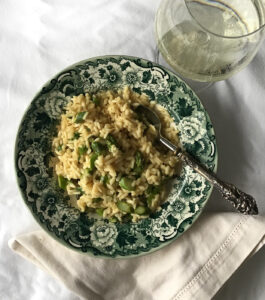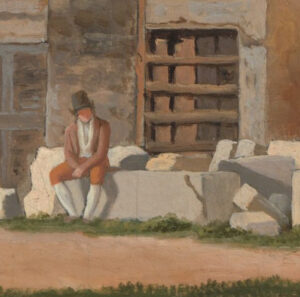Enough
Seven Suggestions for Thinking About Money & Possessions

Mrs. April Jaure
We were poor. We washed sandwich bags and turned them inside out to dry so we could reuse them. We bought all our clothing second-hand, and we only purchased absolute necessities. We saved coins because we could use them at the laundromat. Despite this, I had chosen to bring home a “rice bowl” from church. The thin cardboard, when folded just so, formed a small covered bowl with a slot in the top in which to put money. The description on the bowl explained that in some countries a family of six lived daily on the amount of rice that fit in the bowl. The parishioners were asked to fast and sacrifice, and then place the money they would have spent on other things in the bowl to be returned to an organization that assisted the poor. Luckily, due to the government entitlements we were receiving, we never had to worry about getting enough to eat; we just had to worry about affording everything else.
So we placed our spare pennies and nickels in the rice bowl, hoping that in another part of the world it would go further and maybe help even one person get an additional meal or two. And those pennies and nickels were honestly all we could afford to give.
Then, after our third child was born, my husband got a job with a significantly higher wage. His first paycheck came and, just like that, we were suddenly, solidly, in the middle class. Before its arrival, we knew we were on the cusp of a significant pay increase so my husband and I had a conversation about how we wanted to value our money rightly and steward it well. We agreed that we didn’t want to always be chasing more, but instead to seek satisfaction with what we had, and to realize that even if we couldn’t afford everything we wanted (and who can besides the Elon Musks and Mark Zuckerburgs of the world?) we would realize that we really did have enough.
That conversation was about nine years ago, and, while a desire for simplicity and gratitude for what we have has fueled some of our choices, a brief perusal of last month’s internet purchases tells me that our goal of satisfaction with what we already have is an ideal that is still eluding us. I want simplicity, but my actions at times reveal that I don’t want it quite as much as I want that cardigan that promises to complete that one outfit just perfectly, or those throw pillows that will give the living room a little refresh.
I think what I need is detachment, that interior freedom that is enjoyed when one no longer has excessive concern over possessions. I’m reminded of a quote from St. Teresa of Avila: “Our body has this defect that, the more it is provided care and comforts, the more needs and desires it finds.” Intellectually I know that attempting to satisfy every whim will never bring satisfaction, but it seems that living simply, and being truly detached from one’s possessions is easier said than done. Plus, the billions of dollars spent by advertisers trying to convince me that I, in fact, live in a state of deprivation despite the unprecedented wealth of our era doesn’t do anything to help my good intentions.
Another issue that arises when one wants to live free and unfettered from the never-ending cravings for more, is the practicality of it all. What does “simplicity” actually look like? In the quotidian decisions of whether to purchase, say, a small trinket, or even something as major as buying a house, where precisely is the line between necessity and extravagance? Must we all endeavor to live in tiny houses? Is a two thousand square foot house acceptable? What about five thousand? Unfortunately, like family size, I suspect there is no one-size-fits-all answer. Nevertheless, we would do well to avoid throwing up our hands resignedly and deciding it is impossible before we begin.
I want us to have what we need. But I also want to learn to hold money and possessions loosely, in an open palm. To aid me in that pursuit, I have found seven general principles to be helpful. Perhaps they will be helpful to you as well. Most of us would do well, after all, to take some time now and again to evaluate the place money holds in our value system, and examine whether we hold money or it holds us. The steps below require being honest with oneself about one’s true motivations, and also a certain amount of mercy when it comes to others, because, of course, we can’t know the motivations of anyone but ourselves.
1. Get a reality check.
Does your family earn a living wage? Various tools exist to calculate the living wage for one’s area and family size. While our minds (and the aforementioned advertisements) can always convince us that we need more, I think it’s helpful to get an unbiased opinion on the matter. Of course, some may have extenuating circumstances, such as large medical bills that living wage calculators don’t take into account, but such tools can be a good starting point. If you find that you do, in fact, make enough money to supply your family’s legitimate needs, then it could be worthwhile to pursue satisfaction over the pursuit of “more.”
2. Commit to growing in generosity.
I find the traditional practice of tithing — giving away ten percent of our income to charity — has been a helpful start. I think tithing can train us to notice the needs of those around us because we begin to look for opportunities to give our money away. Did I just bring in one hundred dollars? That means I need to give away ten of them. The fact of the matter is that some do not have what they need to live, but we can sacrifice some of the things that we want in order to help others get what they need.
3. Practice gratitude.
I recently heard about a study that revealed that those who had just felt grateful for something were better able to resist the lure of advertisers to purchase the latest and greatest. It makes sense to me. I have found in my own life that when I am able to notice my own abundance and express gratitude for all I have, I am less apt to convince myself that I need something more. When I am grateful for what I have, I am also satisfied. It reminds me of the ancient Dayenu prayer. Every Passover, the Jewish people recite the thousand-year-old prayer. Dayenu means “It would have been enough.” A section of the Dayenu prayer says:

If God had supplied our needs in the desert for forty years, and had not fed us the manna
—Dayenu, it would have been enough!
If He had fed us the manna, and had not given us the Sabbath,
—Dayenu, it would have been enough!
If He had given us the Sabbath, and had not brought us before Mount Sinai,
—Dayenu, it would have been enough!
If He had brought us before Mount Sinai and had not given us the Torah,
—Dayenu, it would have been enough!
The prayer continues in the same way, recounting all that God has provided over and above what would have been enough. For we who really do have enough, it might be helpful to create our own abundance litany. “If I have enough to eat, even if I can’t afford to eat out, I have enough. If I have a house in good repair, even if it is not large or fancy, I have enough. If my clothes are adequate for the work I do, even if I cannot afford every latest fashion, I have enough.“
4. Make time for leisure.
Along with the pressure to have it all comes pressure to work more to afford it all. I believe leisure can help combat this tendency. A few years back I was invited to a book club, and despite the drive and the fact that I was feeling a bit tired, I didn’t talk myself out of it. Years of attending to the needs of babies and toddlers hadn’t left me with much time for fiction reading, and I thought joining a book club would give me the motivation I needed to stop and read some great literature. At that first gathering we discussed Flannery O’ Conner’s “A Good Man is Hard to Find.” I thoroughly enjoyed the thoughtful discussion and analysis of the short story, and I later told my husband that going to the book club left me feeling like I had come up for air, even though I hadn’t realized I was holding my breath. Maybe what makes your soul feel nourished isn’t fiction; maybe for you it’s gardening, or reading philosophy, or hosting a party with twenty of your closest friends, or maybe something simple like taking an evening to enjoy a cup of tea and a cherished film. Leisure isn’t a luxury. It’s a necessity, and we must make room for it.
5. Prioritize relationships.
It can be easy to tell ourselves that we can’t be hospitable if our house doesn’t look like it came from the pages of a home magazine, but genuine friends won’t worry about that. In fact, they may even be relieved that it doesn’t. When your house looks “lived in” it can take the pressure off of others to have the perfect dwelling. Plus, being okay with gathering amidst real life can make it easier to just gather. Our culture is experiencing a loneliness epidemic in which the majority of people report not having even one close friend to whom they can confide their deepest thoughts and feelings. Deep and meaningful friendships aren’t based on shared perfection, but on vulnerability. Our real lives and our real homes are not an excuse to keep people away. They are, in fact, an opportunity for genuine communion with a friend.
6. Be open to cultivating friendships across class lines.
Growing up, I often accompanied my mother on various “coffee dates.” My mom and one of her friends would treat themselves to coffee and conversation and I was treated to a slice of pie, baked that morning by the woman known to make the best pies in town. I didn’t think much of it at the time, but looking back I notice that my mom (the wife of a mechanic) had friends that included the wives of doctors and lawyers, as well as single and married moms likely living below the poverty line, and lots of women in between. No one’s income or education level mattered. They gathered with one another, shared their joys and challenges, and enjoyed the richness of the other’s company.
7. Ask yourself who will benefit from your purchases.
Along with the loneliness epidemic mentioned above, (and I would hypothesize directly related to it) is the ever-growing trend to tailor each detail of our lives according to our own individual tastes. Instead of enjoying time at the community park, we make our backyards into our own private sanctuaries. Instead of enjoying that new release at the theater, we watch it in our home theater. Even fairly solitary activities like listening to music on the radio need no longer be shared amongst all listeners. We can listen to our personal stations curated for us based on our “likes” and listening history (on headphones). Even the dual climate control of my minivan ensures my husband and I don’t have to compromise on the temperature within our vehicle. We can each set it to the degree each prefers.
Thus, despite the globalism of our age, our lives can become increasingly small, and the place of our own personal whims can take on an air of ever higher importance. But I’ve never known a self-obsessed person to be happy, so perhaps it would be in our own personal interests to consciously practice moderation. One way to do this is by asking ourselves who will benefit from the purchase in question. Maybe that patio furniture would aid you in providing community and hospitality to others, or it would be a place for your introverted spouse to have some quiet in an otherwise busy and active household. But maybe it would be one more item in one’s ever-growing list of so-called “needs” that only serves our own never-ending appetite for more.
Ultimately, our life isn’t about us, and our money shouldn’t be either. It is just and right that people have enough money to provide for their needs, but money should be at the service of people, not the other way round. With a little reflection and practice, perhaps we can reorient our energy to strive for appreciation, satisfaction, and relationship, rather than a futile attempt to fulfill every desire. While our culture emphasizes productivity over wholeness (especially productivity in the service of getting more money), and materialism over genuine fulfillment, we can take a different route. We can seek to hold our possessions loosely, lest they come to possess us.




















